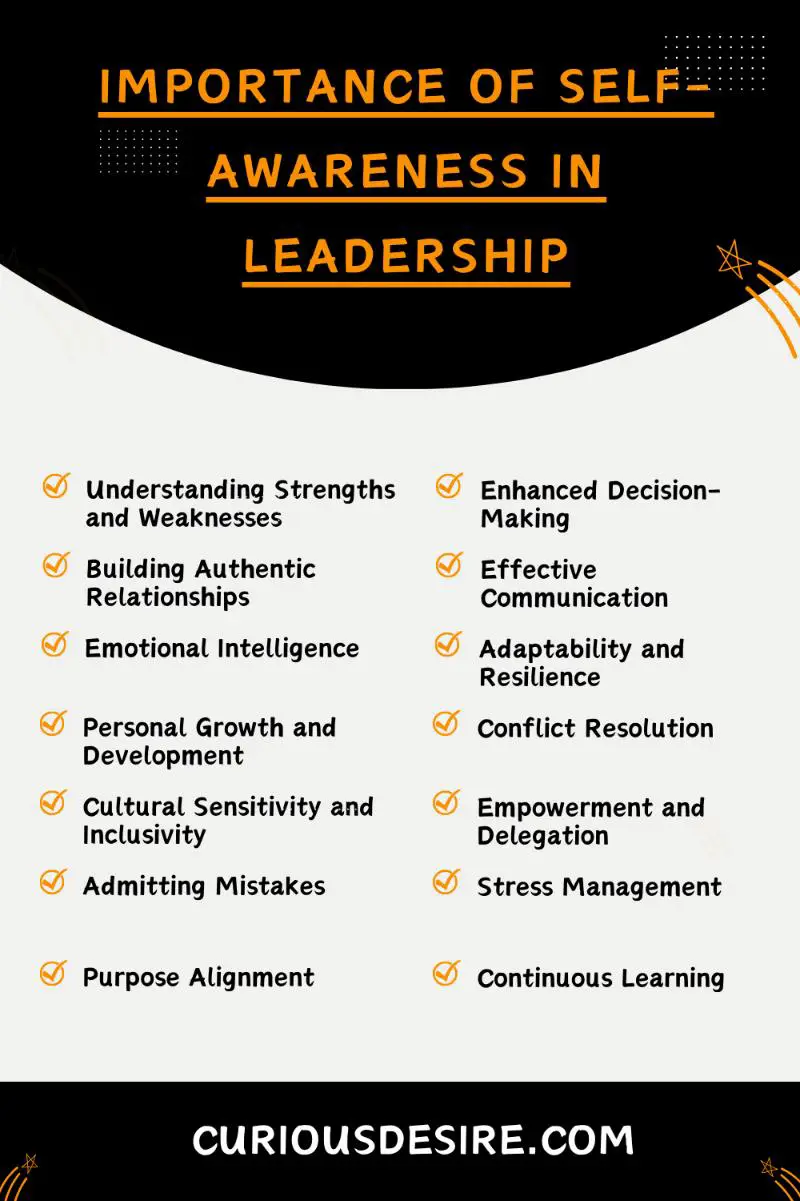Self-awareness stands as a vital trait for successful leadership.
Understanding one’s strengths, weaknesses, emotions, and motivations is essential in tackling the complexities of today’s organizational environments.
This article explores the importance of self-awareness in leadership, highlighting its role in decision-making, communication, adaptability, and building genuine connections within teams.
[toc]

1. Understanding Strengths and Weaknesses
Self-aware leaders have a good understanding of their strengths, weaknesses, and limitations. They recognize what they excel at and where they may need support.
This awareness allows them to leverage their strengths effectively, maximizing their contributions to the team or organization. Additionally, self-aware leaders are proactive in addressing their weaknesses.
They may invest in personal development activities such as training or coaching to improve in areas where they are less proficient.
Alternatively, they may delegate tasks that fall outside their expertise to team members who are better suited for those responsibilities.
By acknowledging both their strengths and weaknesses, self-aware leaders create a more balanced and efficient working environment.
2. Enhanced Decision-Making
Self-awareness allows leaders to approach decision-making with objectivity and clarity.
They make better decisions by understanding their own biases, motivations, and cognitive processes.
They are less likely to be swayed by emotions or external pressures, leading to more rational and well-informed choices.
Moreover, self-aware leaders actively seek input from others and consider diverse perspectives before making decisions, ensuring that all relevant factors are taken into account.
Ultimately, this results in decisions that are more aligned with the organization’s goals and values.
3. Building Authentic Relationships
By being genuine and transparent in their interactions with others, self-aware leaders build authentic relationships.
They are comfortable with who they are and don’t feel the need to put on a facade or conform to societal expectations
This authenticity brings trust and respect among team members, as they feel valued and understood by their leader.
Authentic leaders also inspire loyalty and commitment, as their sincerity and integrity are evident in their actions.
By building authentic relationships, self-aware leaders create a supportive and cohesive team environment where individuals can thrive and collaborate effectively.
4. Effective Communication
Self-aware leaders excel in communication by understanding how their words and actions impact others.
They are mindful of their tone, body language, and choice of words, using the communication style that suits the needs of different individuals and situations.
Self-aware leaders are also skilled listeners, actively seeking feedback and ensuring that everyone’s voice is heard.
By promoting open and transparent communication, they create a culture of collaboration and innovation within their teams.
5. Emotional Intelligence
Self-awareness is a key component of emotional intelligence, which is essential for effective leadership.
Self-aware leaders understand their own emotions and how they influence their behavior and decision-making.
They are also adept at recognizing and empathizing with the emotions of others, creating a supportive and empathetic work environment.
By promoting emotional intelligence, self-aware leaders build stronger relationships and higher levels of team cohesion.
6. Adaptability and Resilience
Self-aware leaders demonstrate adaptability and resilience in the face of challenges.
They can accurately assess situations and recognize when adjustments are necessary.
This agility allows them to respond effectively to change and uncertainty, guiding their teams through turbulent times with confidence and composure.
Moreover, self-aware leaders are resilient in the face of setbacks and failures.
They view challenges as opportunities for growth and learning, remaining positive and proactive in the face of adversity.
By modeling adaptability and resilience, self-aware leaders inspire their teams to overcome obstacles and achieve success.
7. Personal Growth and Development
Self-aware leaders prioritize their personal growth and development, recognizing that continuous improvement is essential for effective leadership.
They actively seek feedback from others and reflect on their experiences, identifying areas for improvement and setting goals for self-improvement.
Self-aware leaders are also lifelong learners, constantly seeking out new knowledge and skills to improve their leadership capabilities.
By investing in their development, they set a positive example for their team members.
8. Conflict Resolution
A leader with good awareness of their inner selves possesses the ability to resolve conflicts within their teams effectively.
They understand their triggers and reactions, which allows them to approach conflict situations with calmness and objectivity.
This self-awareness enables them to remain composed and focused on finding constructive solutions rather than becoming entangled in emotional reactions.
Additionally, self-aware leaders are open to considering different perspectives and are skilled at facilitating discussions that lead to mutually beneficial outcomes.
9. Cultural Sensitivity and Inclusivity
Such leaders are attuned to their own cultural biases and assumptions.
Self-awareness enables them to create inclusive environments where diverse perspectives are valued and respected.
They actively seek to understand the cultural backgrounds and experiences of their team members and promote a sense of belonging and acceptance.
Moreover, they are adept at recognizing and addressing unconscious biases within their teams, ensuring that everyone feels valued and included.
By promoting cultural sensitivity and inclusivity, self-aware leaders create stronger, more cohesive teams that leverage the unique strengths of each individual.
10. Empowerment and Delegation
Another advantage self-aware leaders possess is their comfort in empowering team members and delegating authority.
They trust in the abilities of their team and are secure enough to relinquish control when necessary.
This not only nurtures a sense of ownership and accountability among team members but also allows the leader to focus on strategic priorities.
By empowering their team members, self-aware leaders promote a culture of collaboration, innovation, and personal growth.
11. Admitting Mistakes and Seeking Feedback
Leaders with self-awareness are humble enough to admit their mistakes and seek feedback from others.
They understand that nobody is infallible and view feedback as an opportunity for growth.
By modeling this behavior, they encourage a culture of continuous improvement within their teams.
Self-aware leaders actively seek out feedback from their team members, peers, and mentors, recognizing that constructive criticism is essential for personal and professional development.
Moreover, they openly acknowledge their own mistakes and take responsibility for them, demonstrating integrity and accountability.
12. Stress Management and Well-being
Mindful of their own stressors and coping mechanisms, self-aware leaders take proactive steps to maintain a healthy work-life balance.
By prioritizing self-care, they set a positive example for their team members. They actively support their team members in managing their stress levels.
They encourage open communication about mental health and well-being, providing resources and support to ensure that everyone feels valued and supported.
By promoting a healthy work-life balance and prioritizing well-being, self-aware leaders create environments where individuals can thrive and perform at their best.
13. Vision and Purpose Alignment
With a clear understanding of the values, vision, and purpose, self-aware leaders articulate a compelling vision for the organization and inspire others to rally behind it.
They adeptly align individual and team goals with the broader organizational mission.
Communicating their vision and values authentically, self-aware leaders instill a sense of purpose and direction within their teams.
Moreover, they actively seek input from team members and stakeholders, ensuring everyone feels invested in the organization’s goals.
14. Continuous Learning and Innovation
Importance Of Self Awareness In Leadership FAQs
1. What is the Importance of Self-Awareness?
Self-awareness is crucial for several reasons:
- Enhanced Decision Making: Understanding one’s biases and motivations enables individuals to approach decision-making with objectivity and clarity.
- Effective Communication: Being aware of how one’s actions and words impact others allows for tailored communication, fostering understanding and motivation within teams.
- Emotional Intelligence: Self-awareness is foundational to emotional intelligence, facilitating better management of one’s emotions and understanding of others’ feelings.
- Adaptability and Resilience: Self-aware individuals are better equipped to assess situations accurately, adjust to change, and navigate challenges effectively.
2. Why is Self-Awareness Important in Authentic Leadership?
Self-awareness is vital in authentic leadership because it enables leaders to be genuine and build trust with their teams.
Authentic leaders who understand their strengths, weaknesses, and values can communicate openly and inspire others to follow their vision.
3. What is an example of a Self-Aware Leader?
An example of a self-aware leader is Satya Nadella, CEO of Microsoft.
Nadella is known for his introspective leadership style, acknowledging his own strengths and weaknesses.
He has openly discussed his journey of personal growth and transformation, emphasizing the importance of empathy and continuous learning.
4. What is Self-Awareness and Examples?
Self-awareness refers to the ability to introspectively understand one’s own thoughts, feelings, and behaviors.
Examples include recognizing one’s strengths and weaknesses, understanding how emotions influence decision-making, and being aware of one’s impact on others.
5. Why is Self-Awareness in Leadership Important?
Self-awareness in leadership is crucial because it leads to better decision-making, fosters authentic relationships, improves communication, enhances emotional intelligence, promotes adaptability, and fuels personal growth.
Self-aware leaders can inspire and empower their teams more effectively.
6. What are Self-Awareness and Leadership Development?
Self-awareness in leadership development involves fostering introspection and understanding of one’s strengths, weaknesses, values, and impact on others.
Through self-reflection, feedback, and continuous learning, individuals can cultivate the self-awareness necessary for effective leadership.
7. How to Improve Self-Awareness?
Improving self-awareness involves various strategies, including:
- Engaging in regular self-reflection and introspection.
- Seeking feedback from others and being open to constructive criticism.
- Practicing mindfulness and self-awareness exercises.
- Journaling to explore thoughts, feelings, and experiences.
- Engaging in professional development activities that promote self-awareness.
8. What are Self-Awareness Skills?
Self-awareness skills include:
- Recognizing one’s emotions and their impact on behavior.
- Identifying personal strengths, weaknesses, and blind spots.
- Understanding one’s values, beliefs, and motivations.
- Being aware of how one’s behavior affects others.
- Demonstrating empathy and perspective-taking.
- Engaging in reflective practices to foster continuous self-improvement.

